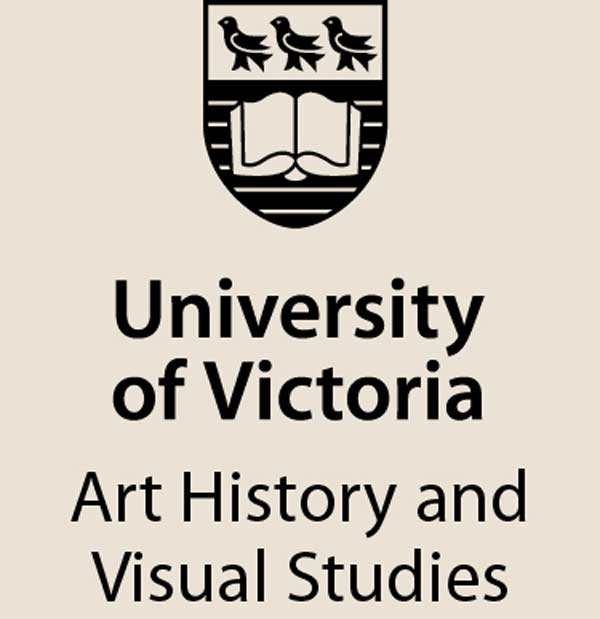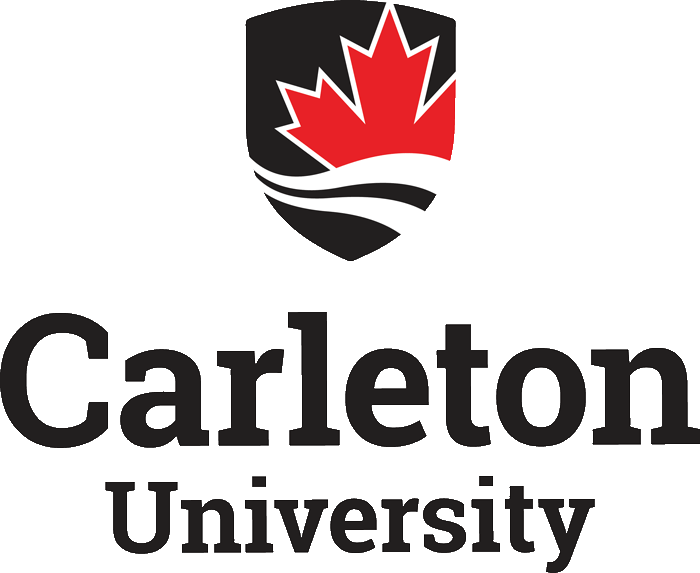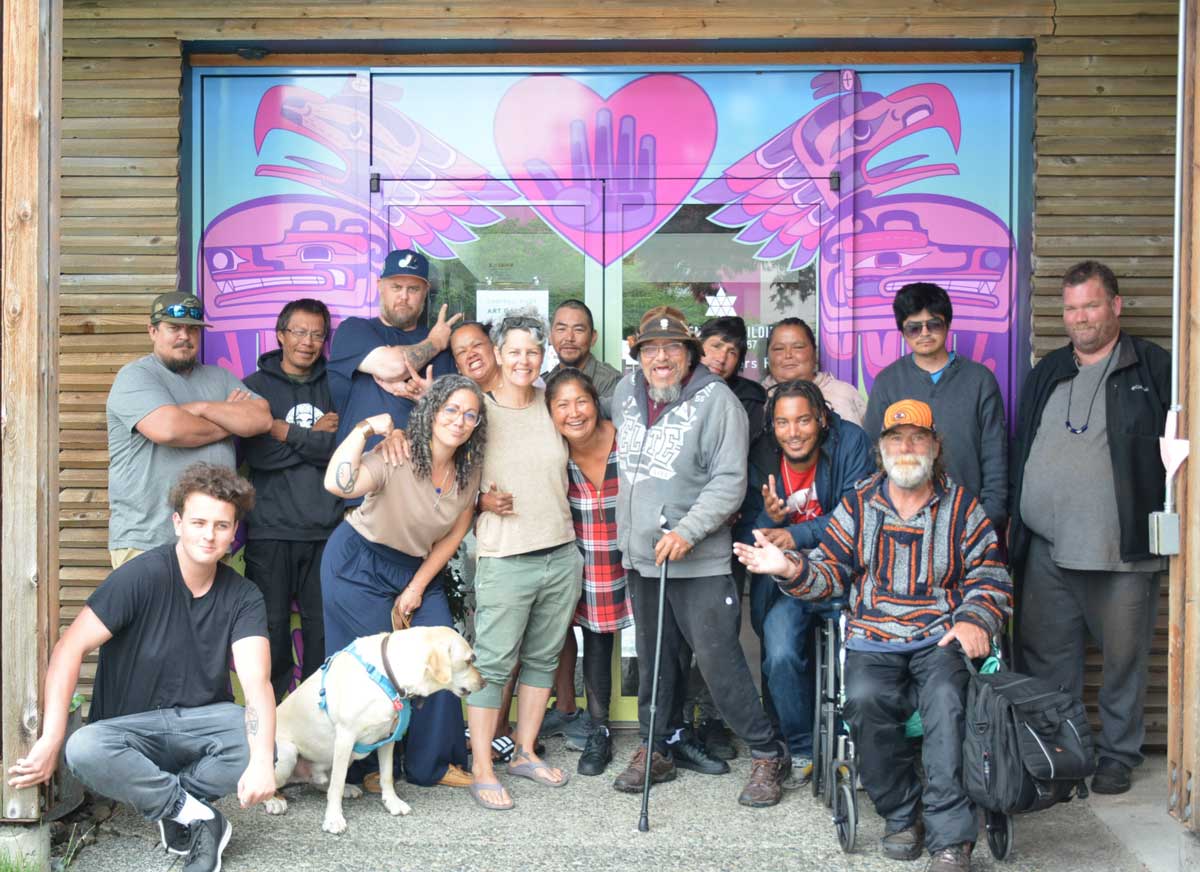
Group shot of Art Hive contributors and participants in front of a public mural made by Peers at the Campbell River Art Gallery.
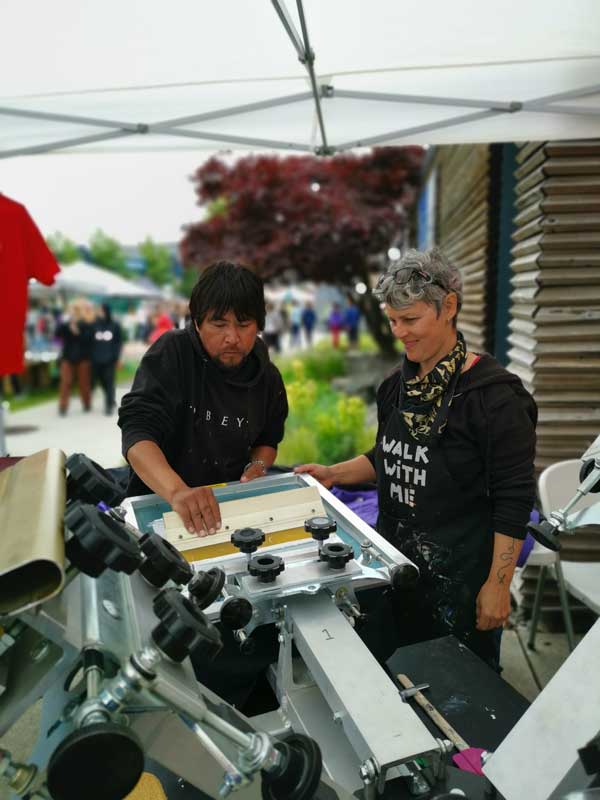
Artist Nadine Bariteau assisting Art Hive participant to screenprint during a public outreach event in downtown Campbell River.
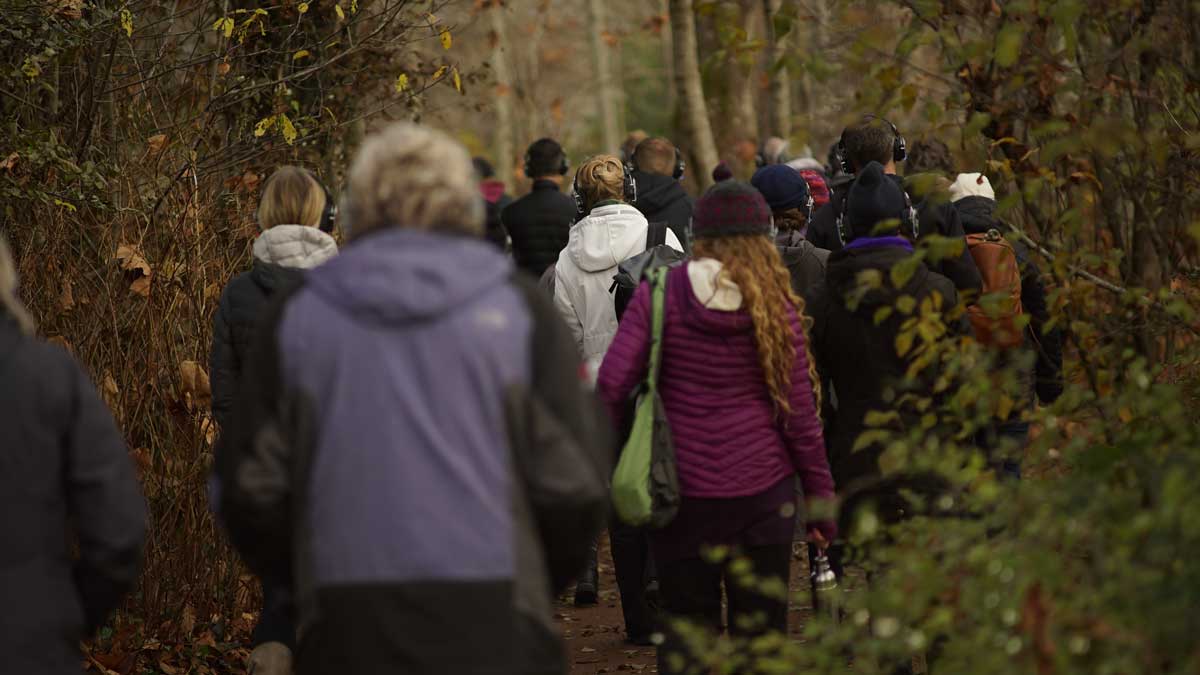
Sharing Circle following a facilitated walk for the Walk With Me project in Campbell River.
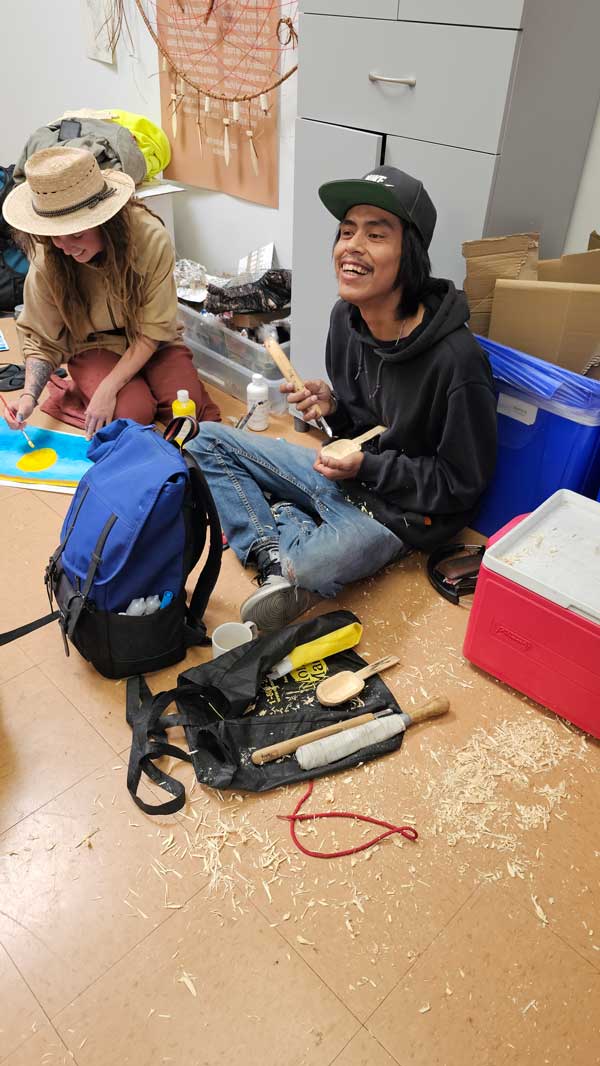
Good food, good music, and good laughs are shared by participants carving and painting during an Art Hive session.
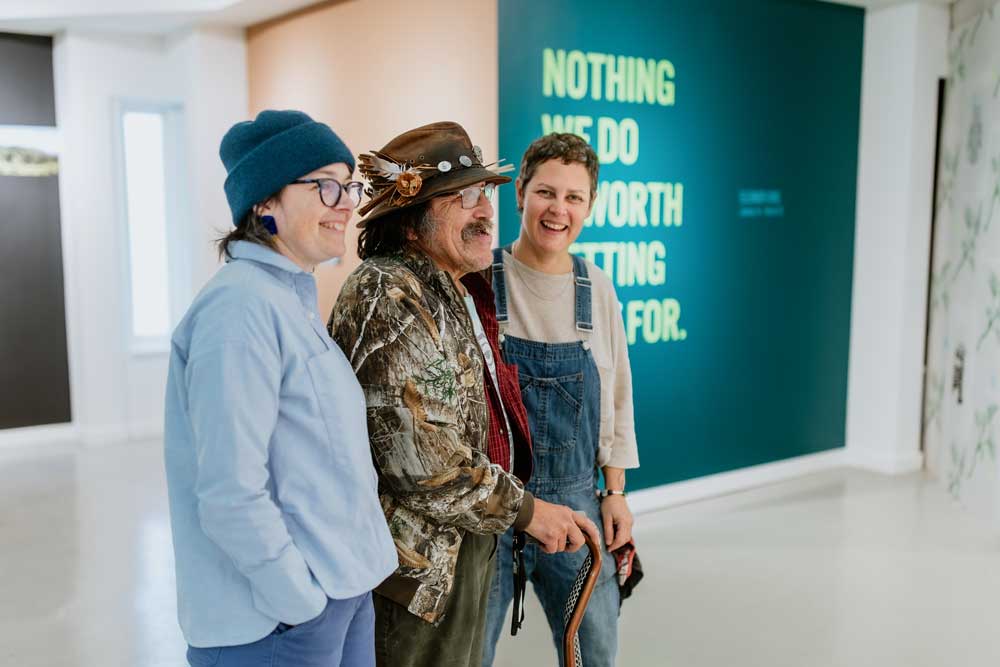
Exhibiting artist Eleanor King, alongside Art Hive participant (and collaborator) John Sharkey and artist Nadine Bariteau, during King’s solo exhibition at the Campbell River Art Gallery.
H.3 What can an art gallery do in a crisis? The Art Hive as an example of radical, decolonizing programming
Sat Oct 21 / 15:30 – 17:15 / KC 201
chairs /
- Jenelle M. Pasiechnik & Sara Lopez Assu, Campbell River Art Gallery
This session examines what decolonizing politics, radical gestures, and togethering practices can look like in contemporary art galleries and Canadian museums today. Through a focus on grass roots programming that responds to immediate community needs and institutional concerns, the session will feature different participant speakers who share and reflect on powerful case studies that demonstrate experimentation, contestation, and growth in and across diversified arts roles and within unique public art sites and spaces.
One example of this to be explored is the Campbell River Art Gallery’s adoption of the Art Hive model, created by Dr. Janis Timm-Bottos, and adapted to serve members of the unhoused community and those affected by the drug poisoning crisis. The impacts of the program have been far reaching and have created opportunities for collaboration across the institution: incoming artists have collaborated with Hive members welcoming them to be part of their exhibitions; Hive members have created work and been part of their own exhibitions; and led by Campbell River Art Gallery Protocol Advisor Cory Cliffe member of the Wei Wai Kum Nation, and Shawn Decaire Knowledge Keeper, Hereditary Chief of the We Wai Kai Nation, the staff team and Hive members have gone through processes of Traditional learning that have been applied to relationship management, conflict resolution, community support, and communication.
Each contributor in the session will discuss their role in complex art ecologies and the transformations their programs and projects have effected in and with communities. The contributions will follow a non-linear, non-traditional format that emphasizes the value of circular discussion, sharing, equality, and togetherness.
keywords: decolonizing, community support, social practice, responsive programming, peers with lived and living experience in the unhoused community, uplifting people through culture
session type: circle conversation
Jenelle Pasiechnik has been the Curator of Contemporary Art at the Campbell River Art Gallery since 2018. She lives and works daily on the unceded, traditional territories of the Liǧʷiɫdax̌ʷ speaking people; the Wei Wai Kai, Wei Wai Kum, and Kwiakah First Nations. Pasiechnik is a Settler curator of European descent. Through a research and relationship based approach, she works to ensure that diverse communities see their experiences reflected in the cultural offerings of the institution. She builds good relations by working in consultation with Liǧʷiɫdax̌ʷ Knowledge Keepers to ground exhibition work on the territory, and works to decolonize the institution and curatorial practice by re-examining current practices, who they are meant to serve, and adapting practice to respond to the needs of artists and communities. Jenelle aims to create impact through exhibitions and programs that support the resurgence and celebration of diverse cultural perspectives, and the recovery of erased histories. Jenelle completed her Masters in art history and visual studies at the University of Victoria on the unceded territories of the Lekwungen speaking peoples of the Songhees and Esquimalt Nations, in 2015. Her thesis examined the work of Parviz Tanavoli, transnational and post-colonial frameworks for studying art histories, the rich artistic traditions of West Asia, and contemporary West Asian artists of the diaspora living and working in Canada.
Born in Montreal (Tiohtià:ke), Sara Lopez Assu received post-secondary degrees from Marianopolis College and Concordia University, in Commerce and Urban Planning. She worked in child development, communications, and academic counseling for many years following her schooling. A desire to raise her kids (Kwakwa̱ka̱ʼwakw and Nuu-chah-nulth) in community, immersed in their culture, led her to move to Campbell River, the traditional territory of the Liǧʷiɫdax̌ʷ people, in 2016. Since then, Sara has been engaged in the community through volunteer Board and governance work and a career in communications and corporate social responsibility. Since 2020, Sara has been the Executive Director of the Campbell River Art Gallery. The Gallery already had a social justice direction and a goal to decolonize its practices and structures under a new Strategic Plan. Sara took this to heart, and has been working tirelessly to turn these vague principles into concrete action and organizational accountability towards reconciliation: crartgallery.ca
What can printmaking do in a crisis?
- Nadine Bariteau, Professional Artist
Nadine Bariteau will discuss her experiences as an artist with a social practice working both individually and collaboratively. In 2018 Nadine stepped into a learning journey of community engaged art practice with her outreach converted printmaking studio van. In 2019 she became the Creative Director of the project "Walk With Me," a community engaged research project addressing the issues of the toxic drug crisis through storytelling walks. Since 2021 she has been the artist facilitator of the CRAG Art Hive, a safe space/studio for people who struggle with housing and substance abuse related to intergenerational trauma. During the Winter Nadine spends three months in diverse communities of Nunavik to learn about the Inuit Nunangat and to share printmaking skills with Inuit artists.
Nadine believes in the richness of printmaking’s political history and its potential to develop impactful reproduction-based art that can shape the cultural and political realms of the contemporary world. She will discuss her learning journey into community engaged art practice and how, with the appropriate guidance, the medium of printmaking can be an effective tool in making steps toward reconciliation.
Lead Facilitator – Art Hive (Campbell River Art Gallery) and Creative Director – Walk With Me. Born in Montreal (Tiohtià:ke), Nadine Bariteau is a queer cross-disciplinary artist and descendant of European settlers whose practice is rooted in printmaking, installation, video/sound and community based research. She completed a Bachelor degree in Visual Art at Concordia and a Master degree in Visual Art at York University. Nadine has been a print-based advocate and teacher in diverse art institutions for the past 15 years (Ontario College of Art and Design University, York University and North Island College fine Art). She also presented her work across the country and beyond.
Radical decolonization in the face of crisis
- Shawn Decaire, Liǧʷiɫdax̌ʷ Knowledge Keeper and We Wai Kai Hereditary Chief
In January 2021, Shawn worked to open Kwesa Place – a gathering space for people experiencing homelessness in Campbell River. As the Manager there, he ensures this community has a safe space to warm up, eat, do their laundry, and have a warm shower. It is through this work that Shawn became involved with Walk With Me in the summer of 2021.
Shawn has been central in connecting this project with people in the community, and ensuring that cultural safety and protocols are upheld and maintained.
As a result of his involvement with Walk With Me, Shawn advised the Campbell River Art Gallery in the creation of the Art Hive – an open studio program for peers with lived or living experience with mental health, substance use, and homelessness. The Program offers participants a welcoming space to be creative, to learn new skills, to express themselves, and to generate revenue through the sale of their artwork. Shawn’s generosity with his time, knowledge, and resources has allowed the program to thrive and break barriers within the larger community.
In January 2023, Shawn was featured as one of four artists in the exhibition “Mu’la” at the Campbell River Art Gallery. This exhibition centered around the theme of gratitude. For the exhibition, he shared the story of “Goliath”, the monolithic 28” hand drum that contributed to Shawn’s cultural revival – it was a drum made to match his voice. “Goliath” was burned in a ceremonial fire in April 2023.
Shawn will speak to Traditional Knowledge and Ways of Being, and how they can be applied to colonial structures like public art galleries. He advocates for radical decolonization as a true act of reconciliation – pushing the boundaries of what has been done in order to better serve the most vulnerable in a community, no matter how unorthodox.
Shawn Decaire descends from the We Wai Kai tribe of the Laxwaxdaxw Nation. In 1999, after years of struggling with addiction, he found himself homeless on the streets of Vancouver’s Downtown Eastside. This moment was a catalyst in changing his path. He found his way home shortly thereafter and began to learn his cultural ways in arts and songs.
Over the last 20+ years he has learned to carve, make traditional bentwood boxes, design and paint in his cultural way, process animal skins to make traditional leather and hand drums, and harvest and gather traditional foods and barks. All these practices were taught to him by different Kwakwa̱ka̱ʼwakw Elders.
Since January 2021, Shawn has been working closely with the street community, running a warming centre. Through this, he also began working with Walk With Me and the Campbell River Art Gallery, advising on cultural safety and traditional knowledge.
Walk With Me – an overview
- Walk With Me Leadership Team
Walk With Me is an arts-based community action project that seeks to uncover the human dimensions of the toxic drug poisoning crisis as it has unfolded locally in Campbell River. Within and through it, a group of artist-researchers, front-line workers and people with lived and living experience have banded together, attempting to come to terms with the impact of the crisis on individuals and community groups through a practice of story sharing. Presenters for this project include Dr. Sharon Karsten: Project Director & Community-Engaged Researcher, Elder Barb Whyte: Heath Advocate & Traditional Knowledge Keeper, and Christopher Hauschildt: Research & Operations Coordinator.
Dr. Sharon Karsten is a cultural and community development researcher and practitioner. She completed her PhD through Simon Fraser University’s School of Communication—focusing on cultural policy, cultural mapping, and community transformation. After defending her dissertation and after many years as Executive Director of the Comox Valley Art Gallery where she oversaw extensive growth, Karsten initiated Walk With Me in 2019 in partnership with community. Throughout her extensive career, Karsten has served in leadership roles within cultural organizations, championing and developing programs rooted in anti-oppression principles and systems-change.
Elder Barb Whyte has been part of the Walk With Me team since the project’s inception. Barb is carrier of the Coast Salish Healing Wand. She is a descendent on the Pentlatch people on her father’s side; her mother was adopted from the residential school orphanage system into the Sahtloot people—the highest-ranking tribe in the K’omoks Territory. Barb comes from Chiefs lineage on both sides of her family. Her grandfather was the appointed chief of the Pentlatch people. Barb has worked in health, has been a nurse by trade for 48 years, and has witnessed a drastic change in the picture of health since the COVID-19 pandemic, with particularly devastating impacts on mental health. She has served over the past four years as the Voice for the Vulnerable Population on the Primary Care Network developed by the Division of Family Practice.
Christopher Hauschildt is a passionate activist who believes that access to mental health, housing, and alleviation from addiction is a human right that all deserve. He feels blessed to be able to use his lived experience to help foster a better future for those who struggle. He has also begun working for AVI Health and Community Services through his association with Walk With Me since joining the team in 2021.
